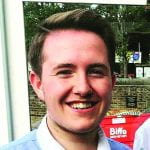by Peter Fell

Over the summer of 2018 I was given the incredible chance to undertake the UROS project, which allowed me to further my subject knowledge, gain vital experience for the future, and to feel like I’ve made a difference to the world.
During my UROS project I worked with Professor Jon Whitehead at the University of Lincoln, who’s an expert on metabolic diseases, obesity, diabetes and inflammation. Initially, I was very nervous about working with him due to his renown and the stigma that surrounds the student-teacher relationship; after a few one-on-one sessions however, my apprehension turned into zeal and passion for the project, after seeing the difference I could make to thousands of people.
My project focussed on the disease Retinitis Pigmentosa (RP) – a genetic condition that causes a breakdown and loss of cells in the retina, ultimately resulting in blindness. Approximately 1 in 4000 people are diagnosed with RP annually across the globe, with some patients developing additional disabilities such as hearing loss and learning disabilities. The disease arises from a mutation in one of 50 genes, each of which has the potential to cause RP to develop in the patient.
The project began on June 26th with a few discussion workshops; this is where I was taught the background of the project, who I’d be working with and why we were doing it. The project consisted of 6 weeks in the university laboratories, performing various experiments and developing reams of results to interpret. One of my first challenges during the project was to familiarise myself with various procedures. As an undergraduate, I was only familiar with a handful of experiments that were going on, and I was overwhelmed at the sheer amount I’d have to learn in the next few days. However, I found the experience of learning dozens of new, interesting protocols very exhilarating, and I found myself learning more in a week of hands-on work than I ever would have learnt in a lecture or timetabled laboratory session.
As the work continued, I found myself learning and using scientific language frequently, and it felt rewarding, yet surreal, to be able to use phrases I’d learnt in lectures in a professional environment. I also found that I was able to interpret data and results in a much more accurate fashion, and that reading through scientific literature was no longer challenging, due to the experience I’d gained during my project.
I found that this project has prepared me for after my undergraduate degree in many ways; I feel that my knowledge of my subject has been deepened immensely, and that my passion for science is greater than ever. The project also gave me a taste of the world of research, and has made my path after University much clearer. Overall, I feel that UROS has made the end of University much less frightening, and has given me the chance to gain vital experience that will help after graduation.
*To view Peter’s project poster, please click on the thumbnail below:

